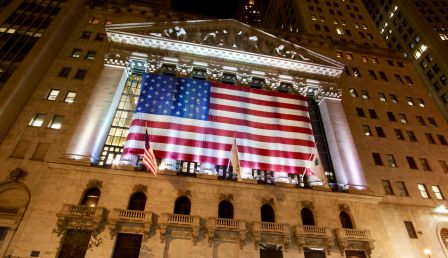Tags: NASDAQ
Why Is the Market Down Today: Tech Titans Like Nvidia Crumble Amid AI Bubble Fears?
Tech titans like Nvidia are crumbling as AI bubble fears and interest rate jitters spark a major market sell-off, pulling the Nasdaq, S&P, and Dow down.
Global Stocks Drop as Japan's Nikkei Falls 13% and European Shares Hit Six-Month Lows
Recession fears pushed global stock markets to experience a major decline on August 5, Monday with Japan's Nikkei dropping 13%, STOXX 600 3%, and Nasdaq futures 5%.
Sweden Penalizes Nasdaq Stockholm for $9.5 Million for Regulatory Non-Compliance
Sweden's financial supervisory authority has fined Nasdaq Stockholm $9.59 million for multiple non-compliance with bourse rules in recent years.
Wall Street Fell on Thursday As Fear of Global Slowdown is Lurking
Plunge of indexes brings the market to negative territory. Financial sectors led the plunge over fear of global financial slowdown.
Latest News
S&P 500 index began this week by slide below closely watched threshold. However, on Wednesday as Asian stock continued raising for third consecutive day, indexes began to recover.
Following slow start of the year, tech companies began to come to life. As Palo Alto Networks, Splunk and Salesforce.com brought Nasdaq to soar 2% in the last five trading days.
Deutsche Borse confirmed that it is in talks with London Stock Exchange regarding a potential merger. The parties remain hopeful that a possible merger transaction will take place.
Stocks dipped to session lows on Tuesday. Shares of oil companies plunged as crude oil continued to slide. Three of major indexes also fell.
USDA monthly outlook reported that soybean crops are expected to reach a record high harvest in six years, thus lowering the price in CBOT. Two other U.S. major crops, corn and wheat also estimated to produce higher than expected result.
Taking positive cues from encouraging gains on Wall Street, Asian stocks with an exception to China moved up on Tuesday. Chinese stock market dropped following the jitters emerging from adverse developments in forms of corruption and illegal trading that dampened the market sentiment.
The concerns about the future course of Viacom among its investors led the continuous drop in stock on Nasdaq. The latest watching ratings on Viacom's MTV, Nickelodeon, Spike and Comedy Central steeply fell when compared to its competitors. This has created doubts among the company's investors, who resorted to offload their holdings on Nasdaq exchange.
The US stocks turn attractive on lower PE ratios. The latest market crash might have eroded $2.1 trillion value in the market capitalization in the US stock markets, but equities are no more overpriced as price-to-earnings (PE) ratios turn attractive. According to ConvergEx, after the recent 10 percent drop in the US markets, no one can say that American stocks are expensive.
The oil price in the global market continued to skid further on Wednesday touching a new low since March 2009 while crude inventories in the US are increasing.
The slowdown in economic growth in major economies is expected to keep the stock markets under four percent annual growth in the near future. The second half of 2015 is expected to be sluggish following the bleak economy outlook for the US, EU and China.







